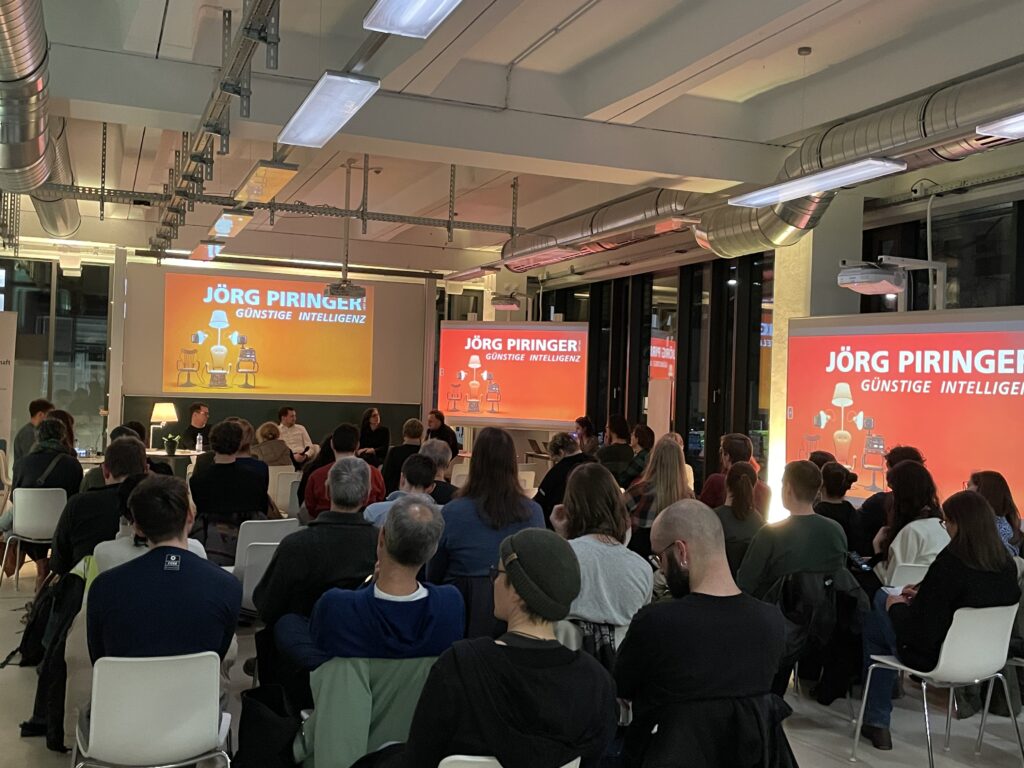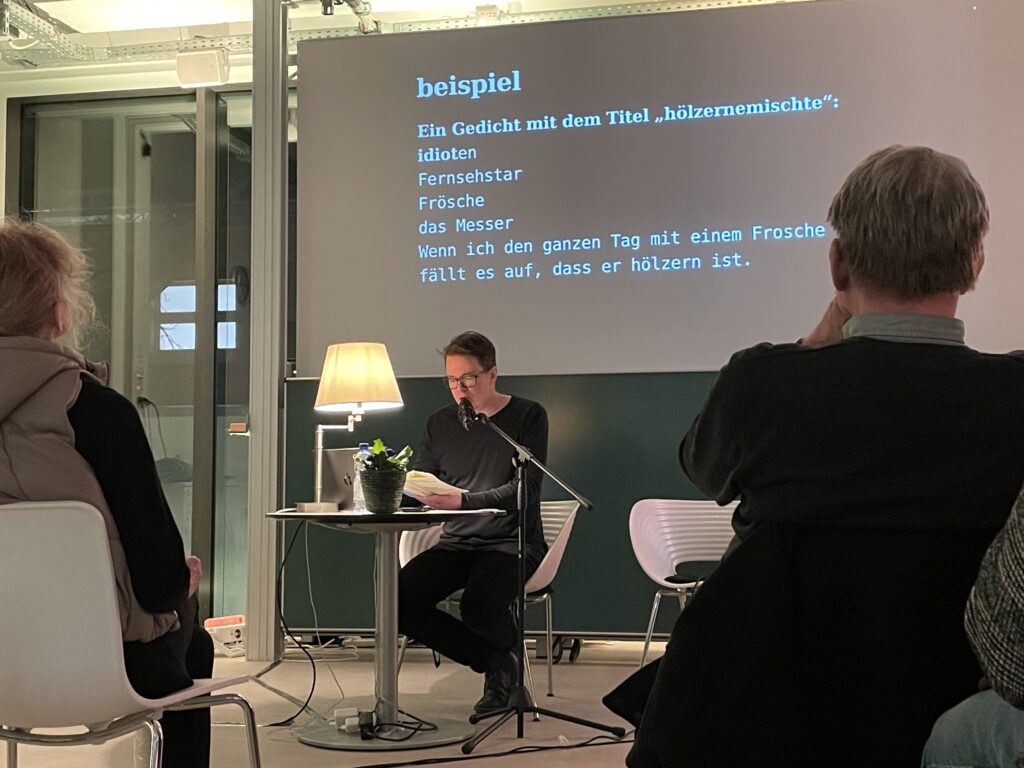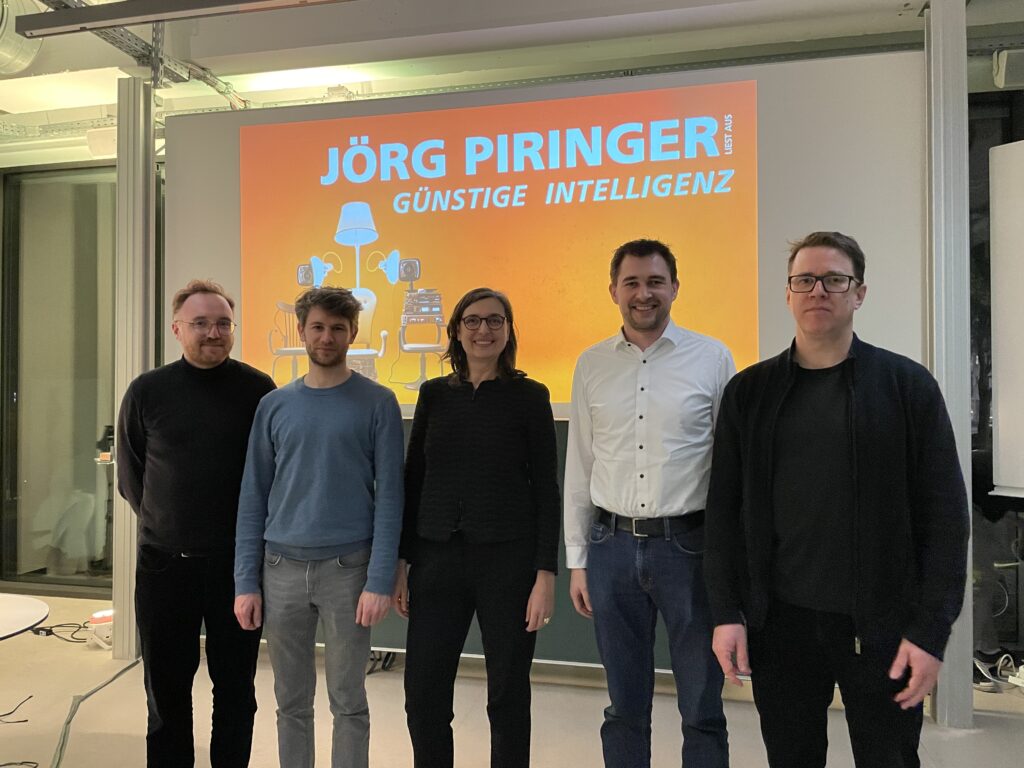The DGPuK conference for the "Media Language — Media Discourse" interest group kicked off on 28.02.2024 in Karlsruhe with an interactive reading and panel discussion with author Jörg Piringer and other guests entitled "Schöne Neue Textwelt" (A Brave New World of Texts). A similar event had already taken place at the Epplehaus in Tübingen in the fall. This time, the venue was located in the mathematics building of the KIT and was already well visited at the start of the event at 19:30.
The evening was open to everyone interested in the topic and aimed to actively involve the audience and reflect together about the dimensions of generative AI. The medium for this was the Mentimeter tool, which the audience used to repeatedly answer questions (and also ask some themselves), share associations and express opinions.

The event was moderated by the editor-in-chief and co-founder of Science Notes, Dr. Thomas Susanka, who asked the audience to share their associations with generative AI right at the beginning. With this initial food for thought in mind, the reading part of the evening began. Jörg Piringer read from his book of poetry "Günstige Intelligenz" (Cheap Intelligence), which he co-created with an early version of ChatGTP. Piringer purchased early access to the AI for just €5.60 in 2021 and began experimenting with the program. Among other things, he asked ChatGTP to output word lists and nonsense words, which he then used to generate poems.
He read out loud some of these poems, alternating with reflective passages about the co-creative work with ChatGTP. Within these passages, Piringer asked himself various questions, for example, what is the intention of the AI? Who is actually the author of the texts written? And what will the future of literary intelligences look like?

The reading was followed by another round of questions directed towards the audience, as well as the joint writing of a prompt for ChatGTP and an evaluation of the results the AI produced. The audience prompt was: "Write an obituary for an air conditioner in a regional dialect without using the word air conditioner". The result was a source of amusement for those present, but it was clear that both the dialect and the genre of the obituary could not be implemented well by ChatGPT.
The interactive part of the evening was followed by a panel discussion, in which Jörg Piringer was joined by Prof. Annette Leßmöllmann, Professor of Science Communication with a focus on linguistics at the KIT and researcher at the RHET AI Center, and Prof. Jan Niehues, Head of the Chair of Artificial Intelligence for Language Technologies at the KIT.

Annette Leßmöllmann opened the discussion with the observation that generative AIs have also found their way into science communication — especially in editorial work — and that there is a lot of reflection happening on the future of co-creativity in science journalism. "We are living in a constant Turing test," she emphasized, in which it must be checked which texts could be AI-generated and which originate from a human mind. This has an impact on recipients and will lead to the development of new cultural techniques.
When it comes to the creativity of artificial intelligence, Jan Niehues argues that non-creative texts in particular, which are primarily formulistic in nature, can be written well by literary AIs. In the future, the use of generative AIs could reach a level similar to that of googling information today, where an AI searches through existing texts and creates new texts from them.
Jörg Piringer sees people's focus on individual preferences, feelings and attitudes as a key unique selling point of humans, which is closely linked to creativity. While artificial intelligences work towards a broad selection of imitations rather than individuality, a special feature of the creative process for Piringer is also the conscious and unique selection of certain text modules and passages, which human authors constantly do during the writing process (also during co-creative writing).
After these initial statements, the discussion was opened up to questions from the audience. Those present were particularly interested in the question of whether AIs will have a personality in the future, which Jan Niehues answered with a highly probable no, as this is currently only possible through very targeted prompting. Annette Leßmöllmann added, that it is however exciting to see how quickly we anthropomorphize computers and artificial intelligences, i.e. attribute a human-like personality to them.
The legal question of the copyright of co-generated texts was also raised by those present. According to Piringer, in his opinion the rights do not lie with the AI but with the human operator. He added that ChatGTP and other generative AIs have been trained with the data and intellectual property of countless artists without them ever being compensated for it.
Finally, the audience ventured a look into the future and wanted to know how the next generation, which is already growing up with artificial intelligence, will perceive it? Jan Niehues is certain that they will shape everyday life in the same way that the spread of cell phones and smartphones did in previous generations. Artificial Intelligence will also become highly relevant for work, for example. In addition, the dichotomy between natural and artificial intelligence will likely disappear, said Annette Leßmöllmann. It may even be necessary at some point to authenticate human-produced or human-verified texts as such.
Following the reading, the DGPuK specialist group conference "Understanding and Communication in the Digital Space" of the interest group "Media Language — Media Discourses" began. You can find a review here.





